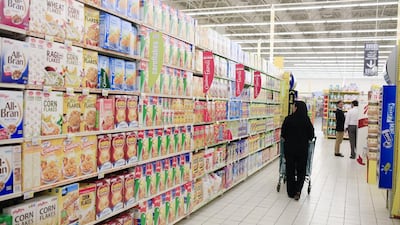Rising wage bills are threatening to push food costs higher, a leading food producer warned on Sunday.
"There is an inflation of wage and service costs, and that's heating up the market," said Nedim Elcheik, the regional commercial and market development director for Cargill Foods, a unit of the Cargill conglomerate.
But he said average economic growth of 4.5 per cent across the Gulf region would “balance” the impact.
Rising accommodation costs are driving the cost of living higher throughout the country as food prices also face inflationary pressures.
Prices of food items and soft drinks inched up by 0.92 per cent in September compared to the previous month, and by 2.91 per cent compared to a year earlier, according to official statistics.
Cargill Foods makes ingredients used in processed foods such as zero calorie sweeteners for chewing gum, and starch.
“Free trade, close cooperation between the private and public sectors and innovation of food products such as longer shelf life” of food products are among the factors that would help to improve food security, according to Mr Elcheik.
He spoke on the sidelines of the first Gulfood Manufacturing trade exhibition, which is a spin-off from the annual Gulfood show.
The UAE consumed 9 million tonnes of food last year, according to a report from Alpen Capital. The figure is expected to grow to 10.5 million tonnes in 2017, at an annual growth rate of 4.2 per cent.
Cargill is also looking to use Dubai as a hub to distribute its food products, and that could happen in the next two years.
“Looking at the infrastructure in [Arabian] Gulf now, and how Dubai is positioned, I think the infrastructure is pretty advanced and the question would you think of eventual risks in carrying out distribution from [here], I think there is zero problem,” said Mr Elcheik.
Cargill currently exports to the region from distribution centres in Istanbul, Amsterdam and Rotterdam.
The company declined to comment on the revenue share of the Middle East, Turkey and North Africa region.
“The region is keen to build up its value-add food processing and manufacturing, and international suppliers look at the Middle East and Dubai as important growth markets,” said Mark Napier, the director of the three-day Gulfood Manufacturing. “Rather than importing finished foods, the region is building up logistics capability, infrastructure and business support climate and reach the growth markets of Middle East, Africa and South Asia.”
Saudi Arabia’s bottled water supplier Health Water Bottling Company acquired a bottling line from the Swiss bottle manufacturer Sidel in September to ramp up its production. The Saudi company markets its water under Nova brand name.
There are substantial efforts to build up food facilities to reduce dependence on finished food imports.
Khalifa Industrial Zone Abu Dhabi is expected to be the home of Brazilian chicken exporter BRF’s US$150 million processing plant, and Abu Dhabi’s National Food Products Company’s Dh1.5 billion facility. Dubai’s halal food manufacturer Al Islami Foods is building a $27.2m food processing facility in Dubai Investment Park.
The UAE is already the largest food processing and re-exporting destination in the region.
ssahoo@thenational.ae
Follow The National's Business section on Twitter

